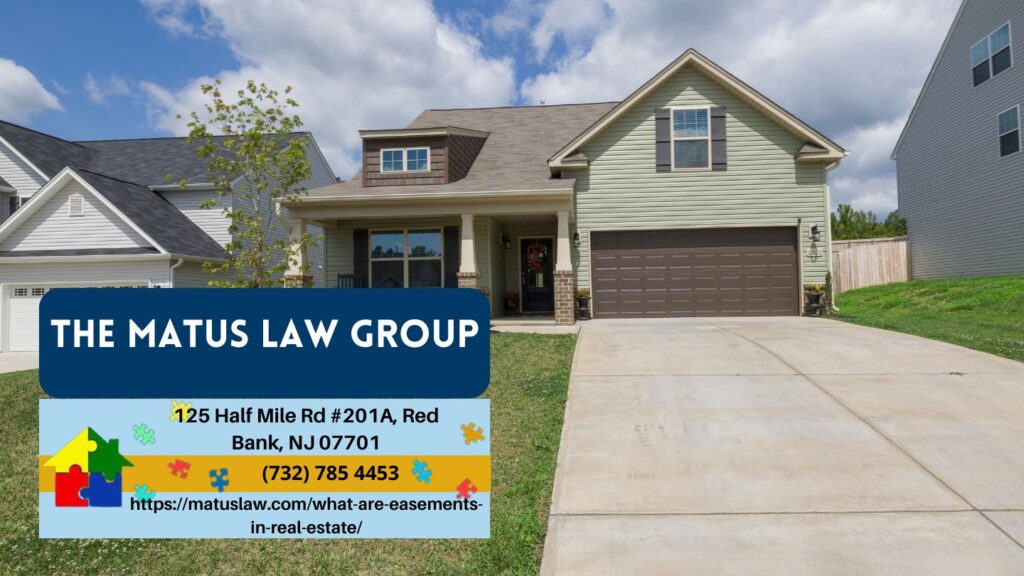Easements are legal rights that allow someone to use a portion of another person’s property for a specific purpose, often without owning it. These rights can impact both residential and commercial real estate, influencing how landowners use or develop their property. In New Jersey, easements may come in many forms. While some easements are clearly outlined in property deeds, others may not be immediately obvious until a title search is conducted or a dispute arises. Because easements can affect property value, usage, and future plans, it’s crucial to understand how they function and what legal implications they carry.
If you’re dealing with a current easement issue or want to make sure you’re not blindsided during a real estate purchase, a knowledgeable New Jersey real estate attorney from The Matus Law Group can help clarify your rights. Our legal team has extensive experience guiding property owners through easement disputes, title concerns, and land use planning. We can review your property records, explain the impact of existing easements, and help you negotiate or challenge unwanted restrictions. Contact us today at (732) 785-4453 to schedule a consultation and take the first step toward protecting your real estate investment.
What is an Easement?
An easement is a nonpossessory right for another party to use your land for a specific purpose. In other words, they don’t own it, but they have the right to use it for designated obligations or purposes. This right remains in effect even if the property is sold.
Common examples of easements include:
- Adjacent property owner rights that allow your neighbor to access a shared driveway or go across your land to reach their own property.
- Municipal easements that give the municipality the right to maintain or install services to your lot or subdivision.
- Utility easements that give service providers access to your property to maintain and operate water, sewer, cable, and telephone lines.
In New Jersey, easements can be created by prescription or extended use over a long time period. For example, if your neighbor can show that they have been using your roadway to access their landlocked piece of real estate for years, they may acquire an easement.
Easements can restrict your ability to add an extension to your home, cultivate a garden, or build a backyard patio. If you don’t comply with the access requirements, you may be legally obligated to undo the obstruction (e.g. deck, swimming pool) at your own expense.
| Aspect of Easements | Details |
|---|---|
| Definition | An easement is a nonpossessory right that allows another party to use your land for specific purposes without owning the land itself. |
| Formation | Easements in New Jersey can be established in various ways, often involving legal procedures. Express easements are contractual and require signatures from both dominant and servient tenements. These are usually recorded with property deeds. |
| Manage | Dealing with easement issues is best done before purchasing property. Conduct a title search to identify existing easements. If issues arise, consult legal counsel and decide whether to proceed with the purchase agreement. |
Formation of Easements
When one property is dependent on another property for access, easements of necessity arise. This means that one property owner can’t reach their barn without crossing the property of another. These situations are usually caused by larger properties being subdivided into smaller parcels. These easements are subject to New Jersey law which presumes that right-of-way applies.
Prescriptive easements are another way that easements can be formed. These easements are based on common law and arise when a servient owner’s property is used for a specific purpose and only temporarily. The land use must be acknowledged by the landowner and must be continually used for at least 20 years. There may also be other restrictions and rules for this type of easement.
Can an Easement Restrict Property Use?
An easement can restrict property use by granting certain rights to another party while limiting how the property owner uses the affected portion. Common easement restrictions include access rights, utility placement, and conservation limitations. These restrictions are legally binding and run with the land unless otherwise stated.

Pros and Cons of Having an Easement on Your Property
Having an easement on your property comes with both benefits and drawbacks. One major advantage is shared access. Easements can provide convenient routes to nearby amenities, such as a shortcut to a local school or a path to a waterfront. This added accessibility may even increase property value in some cases. For example, a scenic walking path or shared driveway can offer practical or lifestyle benefits for homeowners and neighbors alike.
However, easements may also limit how a property owner can use their land. If the easement covers a section of the yard, it might prevent the addition of structures like pools, garages, or sheds. This could restrict future development or landscaping plans. Easements for underground utilities, such as water lines or cables, may limit digging or cause delays in certain projects. Similarly, above-ground utility poles may disrupt the property’s visual appeal.
Driveway easements can also create daily challenges. If multiple people have the right to use the same driveway, there can be issues with parking or access. In such cases, neighbors may need a written agreement about where vehicles should be parked to avoid blocking others.
Understanding the specific terms of an easement and how it fits with long-term plans is important when deciding whether it works in your favor. If you’re considering buying a property with an easement, reviewing the details before making a decision is a wise step.
How Do You Deal With an Easement?
The best time to deal with easement issues is before you buy the property. When you conduct a title search, most easements will show up. If the seller can’t or won’t discharge it, you have to decide whether you want to continue with the purchase agreement.
Easements can be terminated by expiration of their designated term or abandonment. There are other options, like acquiring your neighbor’s land (when adjacent property owner rights create the easement), but they can be expensive and complicated. You will definitely want to speak with a New Jersey real estate attorney about the impact of an easement on a property you own or are thinking about purchasing.
Who Owns Right-Of-Way Property?
Property owners often have questions about who is responsible for maintaining the sidewalk, curb, and trees in the right-of-way next to their home. The right-of-way is the area along the street that the town has access to for municipal purposes.
While the town has right of access, the property owner is generally responsible for the maintenance, repair, and removal of sidewalks, curbs, and trees in the right-of-way next to their property. There are some exceptions, but in most cases, the property owner must take care of these areas even though they are in the public right-of-way.
This can be confusing for homeowners since the right-of-way is on the public street. But just because the town has access to this area does not mean they are responsible for maintaining it. The obligation falls to the property owner in most cases.
Handling right-of-way property issues can be complicated in New Jersey. At The Matus Law Group, our experienced New Jersey real estate attorneys can provide guidance on your responsibilities. We can advise you on disputes with the town over maintenance and help protect your interests when it comes to right-of-way property.
Can an Easement Be Terminated?
An easement can be terminated by agreement between the parties, abandonment, merger of the properties, expiration of the specified term, or through legal action like court-ordered termination. Each method depends on the nature of the easement, how it was created, and the actions of the involved parties.
Speak with a New Jersey Real Estate Attorney at The Matus Law Group Today
Easements can be frustrating to deal with, which is why you need to make an informed acquisition. At The Matus Law Group, our experienced New Jersey real estate attorney can carefully review the title prior to purchase to ensure that you won’t be restricted in how you can use the property, or advise you on the best way to deal with easements that come to light after the fact. For more information or to schedule a consultation with one of our attorneys, contact us at (732) 785-4453.



